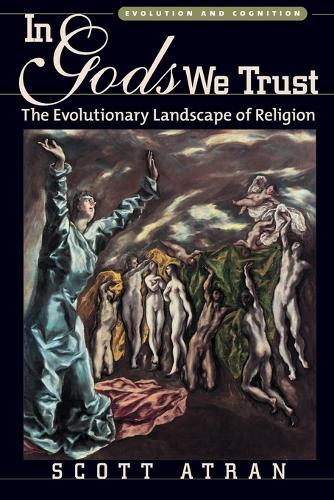Full Product Details
Author: Scott Atran (Directer of Research, Directer of Research, Centre National de la Recherche Scientifique (CNRS), Paris, France)
Publisher: Oxford University Press Inc
Imprint: Oxford University Press Inc
Dimensions:
Width: 23.40cm
, Height: 2.30cm
, Length: 15.90cm
Weight: 0.544kg
ISBN: 9780195178036
ISBN 10: 0195178033
Pages: 388
Publication Date: 06 January 2005
Audience:
College/higher education
,
Professional and scholarly
,
Tertiary & Higher Education
,
Professional & Vocational
Format: Paperback
Publisher's Status: Active
Availability: To order

Stock availability from the supplier is unknown. We will order it for you and ship this item to you once it is received by us.
Reviews
So how, [Atran] asks, is it that religious beliefs and practices are manifest, anywhere there are people, past or present? How could evolution have favoured wasteful investment in preposterous beliefs? ... Quite a project. He relies on a combination of the most recent human sciences. ... One of his exceptional talents is in weaving together a vast number of strands that most of us keep asunder. --Ian Hacking, London Review of Books<br> Atran's work is a brilliant exposition of the evolutionary by-product interpretation [of religion] as well as a mine of references for empirical research into the psychology of religion. --Pascal Boyer, Current Anthropology<br> Scott Atran fell in love with anthropology in 1970 when he went to work with Margaret Mead at the American Museum of Natural History in New York and found himself surrounded by a collection of thousands of skulls. He has spent the intervening years studying human cultures all over the world, dwelling among the secretive Druze sect in Israel, documenting conservation customs among the Maya of Guatemala, and analyzing the evolution of religion everywhere, a topic he explores in his book In Gods We Trust. --Discover Magazine<br> With almost 1000 references and discussions of most of human history and culture, from Neanderthal burials to suicide-bombers in the Palestinian anti-colonialist struggle, this book is consciously and truly encyclopedic in scope, and shows both breadth and depth of scholarship...the reader finds himself constantly challenged and provoked into an intellectual ping-pong game as he follows the arguments and the huge body of findings marshaled to buttress them...Atran managed to combine the old and thenew by relating the automatic cognitive operations to existential anxieties. This combination will be a benchmark and a challenge to students of religion in all disciplines. --Benjamin Beit-Hallahmi, Human Nature Review<br>
<br> So how, [Atran] asks, is it that religious beliefs and practices are manifest, anywhere there are people, past or present? How could evolution have favoured wasteful investment in preposterous beliefs? ... Quite a project. He relies on a combination of the most recent human sciences. ... One of his exceptional talents is in weaving together a vast number of strands that most of us keep asunder. --Ian Hacking, London Review of Books<br> Atran's work is a brilliant exposition of the evolutionary by-product interpretation [of religion] as well as a mine of references for empirical research into the psychology of religion. --Pascal Boyer, Current Anthropology<br> Scott Atran fell in love with anthropology in 1970 when he went to work with Margaret Mead at the American Museum of Natural History in New York and found himself surrounded by a collection of thousands of skulls. He has spent the intervening years studying human cultures all over the world, dwelling among the secretive Druze
<br> So how, [Atran] asks, is it that religious beliefs and practices are manifest, anywhere there are people, past or present? How could evolution have favoured wasteful investment in preposterous beliefs? ... Quite a project. He relies on a combination of the most recent human sciences. ... One of his exceptional talents is in weaving together a vast number of strands that most of us keep asunder. --Ian Hacking, London Review of Books<p><br> Atran's work is a brilliant exposition of the evolutionary by-product interpretation [of religion] as well as a mine of references for empirical research into the psychology of religion. --Pascal Boyer, Current Anthropology<p><br> Scott Atran fell in love with anthropology in 1970 when he went to work with Margaret Mead at the American Museum of Natural History in New York and found himself surrounded by a collection of thousands of skulls. He has spent the intervening years studying human cultures all over the world, dwelling among the secretive Druze sect in Israel, documenting conservation customs among the Maya of Guatemala, and analyzing the evolution of religion everywhere, a topic he explores in his book In Gods We Trust. --Discover Magazine<p><br> With almost 1000 references and discussions of most of human history and culture, from Neanderthal burials to suicide-bombers in the Palestinian anti-colonialist struggle, this book is consciously and truly encyclopedic in scope, and shows both breadth and depth of scholarship...the reader finds himself constantly challenged and provoked into an intellectual ping-pong game as he follows the arguments and the huge body of findings marshaled to buttress them...Atran managed to combine the old and the new by relating the automatic cognitive operations to existential anxieties. This combination will be a benchmark and a challenge to students of religion in all disciplines. --Benjamin Beit-Hallahmi, Human Nature Review<p><br>
Author Information
Scott Atran is a Director of Research at the Institut Jean Nicod at the Centre National de Recherche Scientifique (CNRS) in Paris. He is also Adjunct Professor of Anthropology, Psychology, and Natural Resources and the Environment at the Institute for Social Research at the University of Michigan, Ann Arbor. A respected cognitive anthropologist and psychologist, his publications include Fondement de l'histoire naturelle, Cognitive Foundations of Natural History: Towards an Anthropology of Science, and Folk Biology. He has done long-term fieldwork in the Middle East and has also written and experimented extensively on the ways scientists and ordinary people categorize and reason about nature. He currently directs an international, multidisciplinary project on the natural history of the Lowland Maya.



